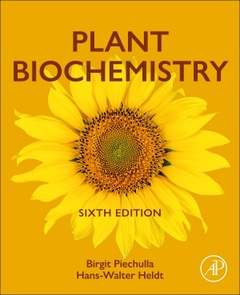Plant Biochemistry (6th Ed.)

Plant Biochemistry, Sixth Edition examines the molecular mechanisms of photosynthesis and highlights and expands this view to all facets facilitating plant life. It delivers the fundamental knowledge of plant biochemistry and explains the biological processes of life, including growth, development, senescence, and interactions between organisms and the environment, with chemical reactions. This book is suitable for advanced undergraduates and graduate students in plant physiology, plant pathology, plant cell biology, and other plant sciences, researchers in industries actively involved in agribusiness, other biotechnology enterprises, and researchers in agronomy, agriculture, plant development and related areas. Covering a broad spectrum of topics in plant biochemistry, this book explores photosynthesis, energy metabolism, carbohydrate synthesis, photorespiration, starch biosynthesis and degradation, sulfate assimilation and nitrogen and nitrate assimilation and biosynthesis of plant proteins. The new edition delineates areas of latest and future research and includes a new and cutting-edge chapter on chlorophyll degradation.
1. Leaf Cells Consist of Several Metabolic Compartments
2. Solar Power and Photosynthesis Are the Basis of Life on Earth
3. Photosynthesis Is an Electron Transport Process
4. Adenosine Triphosphate Is Generated by Photosynthesis
5. Mitochondria Are the Power Station of the Cell
6. The Calvin_Benson_Bassham Cycle Catalyzes Photosynthetic CO2 Assimilation
7. Photorespiratory Pathway Recycles Phosphoglycolate
8. Photosynthesis Needs the Consumption of Water
9. Polysaccharides Are Storage and Transport Forms of Carbohydrates Produced by Photosynthesis
10. Nitrate Assimilation Is Essential for the Biosynthesis of Organic Matter
11. Nitrogen Fixation Enables Plants to Use the Nitrogen in the Air for Growth
12. Products of Nitrogen Fixation and Nitrate Assimilation Are Deposited
13. Sulfate Assimilation Enables the Synthesis of Sulfur-Containing
14. Phloem Transport Distributes Photoassimilates to Various Sites of Consumption and Storage
15. Lipids Are Membrane Constituents and Function as Carbon Stores
16. Special Metabolites Fulfill Specific Biological and Ecological Functions in Plants
17. A Large Diversity of Isoprenoids Has Multiple Functions in Plants
18. Phenylpropanoids Comprise a Multitude of Plant-Specialized Metabolites and Cell Wall Components
19. Multiple Signals Regulate the Growth and Development of Plant Organs and Enable Their Adaptation to Environmental Conditions
20. A Plant Cell Has Three Different Genomes
21. Biosynthesis, Processing, and Degradation of Plant Proteins
22. Biotechnology Alters Plants to Meet the Requirements of Agriculture, Nutrition, and Industry
Hans-Walter Heldt was a professor at the University of Göttingen in the Department of Biochemistry of the plant. He is co-authored over 250 scientific publications and is the co-author of the textbook, Plant Biochemistry. In 1993, he was awarded the Max Planck Research Award together with Marshall Davidson Hatch . Since 1990, he has been a full member of the Göttingen Academy of Sciences.
- Examines not only the molecular mechanisms of photosynthesis but also highlights and expands this view to all facets facilitating plant life
- Delivers the fundamental knowledge of plant biochemistry by explaining the biological processes of life, including growth, development, senescence, and interactions between organisms and the environment, with chemical reactions
- Includes more than 300 two-color diagrams and metabolic schemes
Date de parution : 01-2025
Ouvrage de 605 p.
19x23.4 cm
Thèmes de Plant Biochemistry :
Mots-clés :
<; p>; Plant biochemistry; Photosynthesis; Photosynthetic electron transport; Calvin-Benson-Bassham Cycle; <; /p>; <; P>; C4; C3 and CAM metabolism; Photorespiration; Starch biosynthesis and degradation; Nitrogen and nitrate assimilation; Special/Secondary metabolites and biosynthesis; Plant hormones; Plant biotechnology<; /p>



